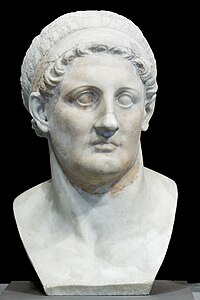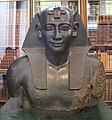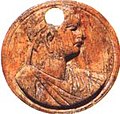தாலமி வம்சம்: திருத்தங்களுக்கு இடையிலான வேறுபாடு
| வரிசை 150: | வரிசை 150: | ||
</gallery> |
</gallery> |
||
==இதனையும் காண்க== |
==இதனையும் காண்க== |
||
* [[தியாடோச்சி]] |
|||
* [[ஹெலனிய காலம்]] |
|||
* [[பண்டைய எகிப்திய அரசமரபுகள்]] |
* [[பண்டைய எகிப்திய அரசமரபுகள்]] |
||
13:01, 27 மே 2020 இல் நிலவும் திருத்தம்
| தாலமி வம்சம் | ||||||||||||||
|---|---|---|---|---|---|---|---|---|---|---|---|---|---|---|
| ||||||||||||||
| நாடு | பண்டைய எகிப்து | |||||||||||||
| விருதுப் பெயர்கள் | பார்வோன் | |||||||||||||
| நிறுவிய ஆண்டு | கிமு 305 | |||||||||||||
| நிறுவனர் | தாலமி சோத்தர் | |||||||||||||
| இறுதி ஆட்சியர் | பதினைந்தாம் தாலமி (எகிப்து), ஏழாம் கிளியோபாட்ரா (எகிப்து) | |||||||||||||
| இனம் | கிரேக்கர்கள் | |||||||||||||
| எகிப்திய அரசமரபுகள் மற்றும் ஆட்சிக் காலம் |
|---|
|
அனைத்து ஆண்டுகள் கிமு |
தாலமி வம்சம் (Ptolemaic dynasty) பேரரசர் அலெக்சாந்தர் கிமு 323-இல் மறைவின் போது அவருக்கு நேரடி வாரிசுகள் இல்லாதபடியால் நடைபெற்ற வாரிசுரிமைப் போட்டியின் காரண்மாக கிரேக்க மாசிடோனியப் பேரரசை, அவரது நண்பர்களும், தலைமைப் படைத்தலைவர்களும் பிரித்துக் கொண்டு ஆண்டனர். அலெக்சாந்தரின் உறவினரும், கிரேக்க தலைமைப் படைத்தலைவுருமான தாலமி சோத்தர் பண்டைய எகிப்து மற்றும் கானான் மற்றும் சைப்பிரஸ் பகுதிகளுக்கு கிமு 305 முதல் பேரரசர் ஆனார். இவரது பெயரால் தாலமி வம்சம் துவங்கியது. இவ்வம்சத்தின் இறுதியில் பண்டைய எகிப்தை ஆண்ட இறுதி பதினைந்தாம் தாலமியின் அன்னை ஏழாம் கிளியோபாட்ராவுடன் கிமு 30-இல் தாலமி வம்சத்தவர்களின் ஆட்சி முடிவுற்றது. எகிபதிய நாடு உரோமைப் பேரரசின் கீழ் ஒரு மாகாணமாக மாறியது.
Ptolemy I's father), was a Macedonian Greek[1][2][3][4][5] royal family, which ruled the Ptolemaic Kingdom in Egypt during the Hellenistic period. Their rule lasted for 275 years, from 305 to 30 BC.[6] They were the last dynasty of ancient Egypt.
Ptolemy, one of the seven somatophylakes (bodyguards) of Macedon who served as Alexander the Great's generals and deputies, was appointed satrap of Egypt after Alexander's death in 323 BC. In 305 BC, he declared himself Ptolemy I, later known as Sōter "Saviour". The Egyptians soon accepted the Ptolemies as the successors to the pharaohs of independent Egypt. Ptolemy's family ruled Egypt until the Roman conquest of 30 BC.
Like the earlier dynasties of ancient Egypt, the Ptolemaic dynasty practiced inbreeding including sibling marriage, but this did not start in earnest until nearly a century into the dynasty's history.[7] All the male rulers of the dynasty took the name Ptolemy, while queens regnant were all called Cleopatra, Arsinoe or Berenice. The most famous member of the line was the last queen, Cleopatra VII, known for her role in the Roman political battles between Julius Caesar and Pompey, and later between Octavian and Mark Antony. Her apparent suicide at the conquest by Rome marked the end of Ptolemaic rule in Egypt.
தாலமி வம்ச ஆட்சியாளர்கள்


Dates in brackets represent the regnal dates of the Ptolemaic pharaohs. They frequently ruled jointly with their wives, who were often also their sisters. Several queens exercised regal authority. Of these, one of the last and most famous was Cleopatra ("Cleopatra VII Philopator", 51–30 BC), with her two brothers and her son serving as successive nominal co-rulers. Several systems exist for numbering the later rulers; the one used here is the one most widely employed by modern scholars.
- Ptolemy I Soter (303–282 BC)[10] married first Thaïs, then Artakama, then Eurydice, and finally Berenice I
- Ptolemy II Philadelphus (285–246 BC)[11] married Arsinoe I, then Arsinoe II; ruled jointly with Ptolemy Epigonos (267–259 BC)
- Ptolemy III Euergetes (246–221 BC) married Berenice II
- Ptolemy IV Philopator (221–203 BC) married Arsinoe III
- Ptolemy V Epiphanes (203–181 BC) married Cleopatra I Syra
- Ptolemy VI Philometor (181–164 BC, 163–145 BC) married Cleopatra II, briefly ruled jointly with Ptolemy Eupator in 152 BC
- Ptolemy VII Neos Philopator (never reigned)
- Ptolemy VIII Physcon (170–163 BC, 145–116 BC) married Cleopatra II, then Cleopatra III; temporarily expelled from Alexandria by Cleopatra II from 131-127 BC, then reconciled with her in 124 BC.
- Cleopatra II Philometora Soteira (131–127 BC), in opposition to Ptolemy VIII Physcon
- Cleopatra III Philometor Soteira Dikaiosyne Nikephoros (Kokke) (116–101 BC) ruled jointly with Ptolemy IX Lathyros (116–107 BC) and Ptolemy X Alexander I (107–101 BC)
- Ptolemy IX Lathyros (116–107 BC, 88–81 BC as Soter II) married Cleopatra IV, then Cleopatra Selene; ruled jointly with Cleopatra III in his first reign
- Ptolemy X Alexander I (107–88 BC) married Cleopatra Selene, then Berenice III; ruled jointly with Cleopatra III till 101 BC
- Berenice III Philopator (81–80 BC)
- Ptolemy XI Alexander II (80 BC) married and ruled jointly with Berenice III before murdering her; ruled alone for 19 days after that.
- Ptolemy XII Neos Dionysos (Auletes) (80–58 BC, 55–51 BC) married Cleopatra V Tryphaena
- Cleopatra V Tryphaena (58–57 BC) ruled jointly with Berenice IV Epiphaneia (58–55 BC) and Cleopatra VI Tryphaena (58 BC)
- Cleopatra ("Cleopatra VII Philopator", 51–30 BC) ruled jointly with Ptolemy XIII Theos Philopator (51–47 BC), Ptolemy XIV (47–44 BC) and Ptolemy XV Caesarion (44–30 BC).
- Arsinoe IV (48–47 BC), in opposition to Cleopatra
தாலமி வம்ச மரம்
புகழ் பெற்றவர்கள்

படக்காட்சிகள்
-
Ptolemy of Macedon founded the Ptolemaic Dynasty.
-
Ptolemy II
-
Ptolemy III
-
Ptolemy IV
-
Ptolemy V
-
Ptolemy VI
-
Cleopatra II (right)
-
Ptolemy VIII
-
Ptolemy IX
-
Ptolemy X
-
Ptolemy XI
-
Ptolemy XII
-
Ptolemy XIII and Isis
-
Ptolemy XIV
-
Cleopatra VII
-
Ptolemy XV, commonly called Caesarion.
இதனையும் காண்க
மேற்கோள்கள்
- ↑ Jones, Prudence J. (2006). Cleopatra: A Sourcebook. University of Oklahoma Press. பக். 14. https://archive.org/details/cleopatrasourceb0000jone. "They were members of the Ptolemaic dynasty of Macedonians, who ruled Egypt after the death of its conqueror, Alexander the Great."
- ↑ Pomeroy, Sarah B. (1990). Women in Hellenistic Egypt. Wayne State University Press. பக். 16. "while Ptolemaic Egypt was a monarchy with a Greek ruling class."
- ↑ Redford, Donald B., தொகுப்பாசிரியர் (2000). The Oxford Encyclopedia of Ancient Egypt. Oxford University Press. "Cleopatra VII was born to Ptolemy XII Auletes (80–57 BCE, ruled 55–51 BCE) and Cleopatra, both parents being Macedonian Greeks."
- ↑ Bard, Kathryn A., தொகுப்பாசிரியர் (1999). Encyclopedia of the Archaeology of Ancient Egypt. Routledge. பக். 488. "Ptolemaic kings were still crowned at Memphis and the city was popularly regarded as the Egyptian rival to Alexandria, founded by the Macedonians."
- ↑ Bard, Kathryn A., தொகுப்பாசிரியர் (1999). Encyclopedia of the Archaeology of Ancient Egypt. Routledge. பக். 687. "During the Ptolemaic period, when Egypt was governed by rulers of Greek descent..."
- ↑ Epiphanius of Salamis, however, puts the total number of years of the Ptolemy dynasty at 306. See: Epiphanius' Treatise on Weights and Measures - The Syriac Version (ed. James Elmer Dean), University of Chicago Press 1935, p. 28 (note 104), or what was from 306/5 BCE to 1 CE.
- ↑ Move over, Lannisters: No one did incest and murder like the last pharaohs on The A.V. Club
- ↑ Walker, Susan; Higgs, Peter (2001), "Painting with a portrait of a woman in profile", in Walker, Susan; Higgs, Peter (eds.), Cleopatra of Egypt: from History to Myth, Princeton, N.J.: Princeton University Press (British Museum Press), pp. 314–315, ISBN 9780691088358.
- ↑ Fletcher, Joann (2008). Cleopatra the Great: The Woman Behind the Legend. New York: Harper. ISBN 978-0-06-058558-7, image plates and captions between pp. 246-247.
- ↑ Wasson, Donald (February 3, 2012). "Ptolemy I". Ancient History Encyclopedia. பார்க்கப்பட்ட நாள் October 1, 2016.
- ↑ Tunny, Jennifer(2001)The Health of Ptolemy II Philadelphus. The Bulletin of the American Society of Papyrologists/ Vol.38(1/4), pp.119-134
- ↑ Pfrommer, Michael; Towne-Markus, Elana (2001). Greek Gold from Hellenistic Egypt. Los Angeles: Getty Publications (J. Paul Getty Trust). ISBN 0-89236-633-8, pp. 22–23.
மேலும் படிக்க
- Susan Stephens, Seeing Double. Intercultural Poetics in Ptolemaic Alexandria (Berkeley, 2002).
- A. Lampela, Rome and the Ptolemies of Egypt. The development of their political relations 273-80 B.C. (Helsinki, 1998).
- J. G. Manning, The Last Pharaohs: Egypt Under the Ptolemies, 305-30 BC (Princeton, 2009).
வெளி இணைப்புகள்
- Livius.org: Ptolemies — by Jona Lendering.


















